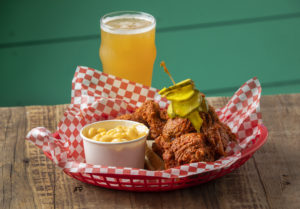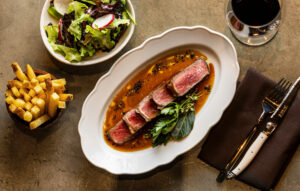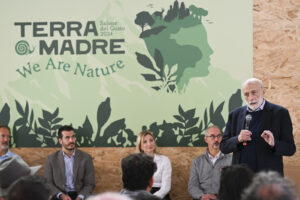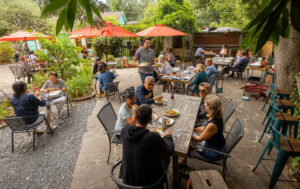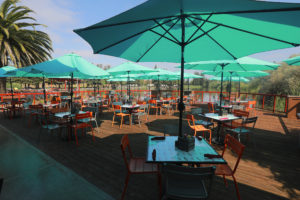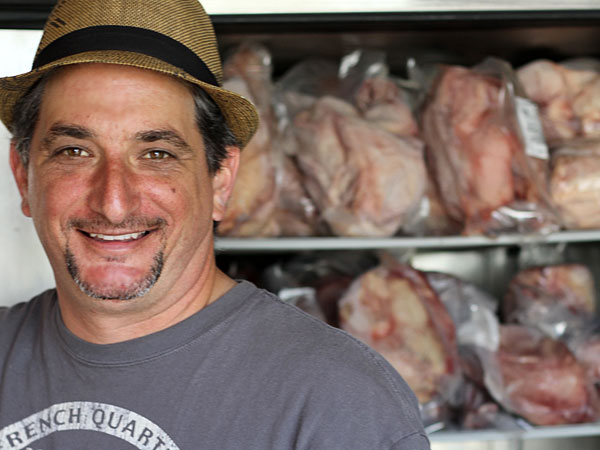[sh-slideshow-post id=”25383″]
The slogan “Life’s too short to eat crappy meat” is written into the concrete in front of Adam Parks’ Sebastopol butcher shop. More than a clever saying, it’s become a mantra for the owner of Victorian Farmstead Meats. Written, essentially, in stone.
Parks’ mission: A direct, hoof-to-table connection between ranchers and meat consumers. Though the scale of his operation is small–just a few hundred pounds of local beef, pork, lamb and poultry sold each week, it’s part of a growing trend toward knowing just where our food comes from. In other words, Parks knows exactly how your steak got from the field to your plate.
Victorian Farmstead’s growing local meat CSA (Community Supported Agriculture) program has more than 100 members who receive bi-weekly meat boxes filled with grass-fed steaks, lamb roasts, hams, bacon, sausage or chickens from his own ranch or those of his partners at Marin’s Stemple Creek, Petaluma’s Langley Farms and a few carefully chosen others.
“I strive to have a shop that specializes in local, all-natural meats as well as specialty and custom cuts you can’t get at the chain stores. Meat raised, slaughtered, and cut the right way, the way it used to be done,” explains Parks.
“Shop” may be a bit of a stretch to describe the 200-square-foot outbuilding the Sebastopol rancher has set up on his Gravenstein Highway farm. In addition to his own chickens, Parks sells sustainably grown meats from his nearby Stemple Creek and Langley Farms.
Tucked behind the stately blue Victorian house that once belonged to his grandparents, Parks slides open the barn doors of his Chop Shop to reveal a large freezer and a packed deli case. There’s just room to slip inside for a peek, but mostly you stand at the door and pick up your VF Subscription box or just order a la carte from what Parks has written on the chalkboards nailed to the door. It’s the antithesis of the carefully shrink-wrapped pieces of anonymous feedlot meat you find at a big-box store.
Rarely without his signature fedora, sunglasses and sly grin, Parks later this year hopes to open a second Chop Shop at the forthcoming Barlow Center. The culinary and retail space in downtown Sebastopol, still under construction, promotes itself on a corrugated-tin sign at the constructin site as “The Butcher, The Baker, The Candlestick Maker.”
“I want to be the Butcher,” says Parks.
But the path to becoming a sustainable-meat purveyor hasn’t been an easy one. A former PGA Tour director, Parks spent most of his life avoiding his family’s rural roots. In 2009, he and his wife took over operation of his family’s iconic Christmas tree farm, and began transforming the five-acre plot into a poultry farm. He currently raises chickens for eggs and meat, along with seasonal turkeys. Parks has an additional plot nearby where he pastures several hundred birds.
Walking the grounds, its apparent most of the birds live a pretty pastoral existence, fledging in an impeccably neat barn, then moving out to moveable “tractor” pens to pick and scratch at the pasture until they’re ready for processing. But that’s where things get a bit more complicated.
With the closure of the Fulton Farms processing plant, Sonoma County lost its last chicken slaughterhouse–the last USDA-approved plant to commercially slaughter chickens within 100 miles. So, to comply with federal standards, ranchers instead are required now to transport their animals to Stockton for slaughter, then bring the processed animals back to Sonoma County to sell. It’s something Parks says is not only unsustainable and against the idea of a local food movement, but puts the animals under unnecessary stress.
For awhile, Parks slaughtered about 150 chickens per week on his Sebastopol farm under what he claimed was a USDA exemption for slaughter on private land. The county balked, and shut down the slaughtering. He’s currently working with the county to resolve the dispute, and compliance could cost him up to $40,000. So instead, he trucks the birds to Stockton.
“Anyone can pick, wash and put up a vegetable stand. So why can’t I have a meat stand?” said Parks. “So much of this is just common sense. The last thing I’m going to do is make someone sick. I’d be out of business five minutes ago,” said Parks.
Parks’ chickens retails for up to $25, compared to $6-$12 for grocery store chickens. It’s a significant difference, but the cost of raising the birds sustainably, in addition to trucking them to slaughter, adds to the cost. The flavor, however, is unmistakable — less mushy, more “chicken-y.”
Whether at local farm markets or his own Sebastopol stand, Parks is a constant champion for locally-raised meat. “Life really is too short to eat crappy meat,” he says.
Want to join the CSA or find out more? Check out Parks’ site at vicfarmmeats.com


